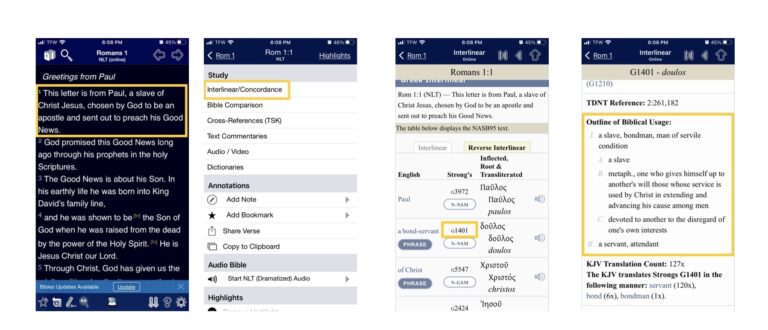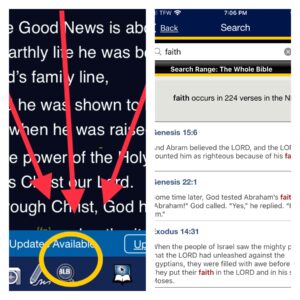Learn to Study

How Do I Study?
There are lots of different ways to study your Bible. We recommend using a concordance, inductive studies, and the topical and expository methods. We‘ll show you each of these with more explanation below.
Use A Concordance
This requires a curious mind and, obviously, the use of a concordance. If you don’t own a paper concordance click here to download a free digital Bible with one already built in. This is the one we’ll be using in the demo below.
I would like to take you on a walk through and teach you how to do a basic word study right now. Word studies are critical if you really want to understand what the author was trying to say before it was translated (interpreted) by someone else. It’s almost like having direct access to the Dead Sea Scrolls! So, if you’re serious about learning to study the Bible, the next five minutes can change your life.
Open up your Blue Letter Bible app and go with me to the book of Romans. Let’s start reading… “Paul, a servant of Jesus Christ…” Now I have a question….
Why does Paul call himself a servant? I thought Jesus came to set the captives free! What could he mean? Time to look in the concordance and find out! First, we click on the verse we’re seeking info about, in this case Romans 1:1. At the top of the menu we see the Interlinear/Concordance tab. Press that to explore a whole new world!

Now we can see the original Greek writings and their English translations. In the center of these English and Greek words are numbers. These are reference numbers for the Strong’s concordance, which is something like a dictionary. Click on the number 1401, associated with bond-servant or slave for an explanation of exactly what this Greek word means.
With a quick scan I can see the Greek word used for this is duolos, meaning a servant or slave; someone whose will is completely subject to the will of another; and that this particular word places emphasis on the relationship, not the service. This reminds me of the relationship that all believers have with Jesus, serving and subjecting our will to God and walking with Him seeking relationship, not works. So I totally get what Paul is saying now.
Let’s read some more… “Paul, a servant of Jesus Christ, called to be an apostle…” What’s an apostle you may ask? Repeat the process and find out exactly what it is! While this is not the most time efficient method, it is the most thorough and is guaranteed to bring you deeper understanding of the text, so if you’re seeking the truth it’s worth the time. I find myself using this method more than any other one.
The Inductive Method
The inductive method simply put is reading the Bible book by book and drawing conclusions from the text as a whole.
If your loved one had written you a letter, you would read the whole thing and not just a select few sentences, right? The same principle is applied here.
This method allows you to see what the writer was really striving to communicate to the reader and how you can apply the message to your own life. It provides general insight into the topics presented by the author.
Topical Study
This is done simply by choosing a topic of interest; for example love, faith, sacrifice, and looking it up in your Bible. To do this in the BLB app you must click the BLB search tool in the bottom left corner of the screen. Enter your search topic in the search bar and voila!
This search will exhaustively list every occurrence of the word along with it’s place in scripture. It’s a great resource for providing insight into your subject of interest.
Search for as many instances as you need in order to deepen your understanding.

Expository
This is particularly interesting for those of you who want to feel the history of the text as you read it. Learning about the culture of the time, social issues the people were experiencing, gods of the age and more can help you understand the heart of the writer and direct issues he was addressing.
An expository study should feel like a step back in time. A great and affordable way to do this is through a Faithlife Connect subscription. It will give you access to Logos Bible Software, which is full of colorful and real life images, as well as useful information and word study tools.
Just be careful not to lose sight of the fact that what is written applies to your life too, not just those “Corinthian heathens”.
No matter what method you choose, Bible study should always end with deepened understanding of God’s heart towards yourself and the people around you. God’s word applies to everything we experience in a day socially, politically, and personally. Let what you learn become your filter for life, using the principles taught to make decisions that give honor to God daily and show Him the love that you have for Him.
If you like what you’ve read so far, come join us in the blog section for more insights and exciting conversations. We can’t wait to meet you there!
